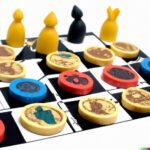Board games have long been a favorite pastime for many, providing hours of entertainment and challenges for players of all ages. Among these classic games is Clue, a murder mystery board game that requires players to use their deductive skills to solve the crime. The strategy of the board game Clue is essential in unraveling the mystery and emerging victorious.
In Clue, players take on the roles of suspects investigating a murder in a mansion, trying to determine the culprit, weapon, and location of the crime. The objective is to make accurate accusations before your opponents do, ultimately solving the mystery first. However, achieving this goal requires more than luck – strategic thinking is crucial in outsmarting your rivals and deducing the correct combination of cards.
Developing a winning strategy in Clue involves careful planning, logical reasoning, and effective decision-making. Players must analyze clues provided throughout the game, make deductions based on information gained from others’ actions or lack thereof, and strategically move around the mansion to gather more evidence. By honing their strategic skills and paying attention to details, players can increase their chances of solving the mystery and winning the game.
Overview of the Game Rules and Objective
The board game Clue, also known as Cluedo in some countries, is a classic murder mystery game that has been entertaining players for decades. Created by Anthony E. Pratt in 1944, the game involves players assuming the roles of characters trying to solve a murder mystery by deducing the culprit, weapon, and location of the crime. The objective of Clue is to be the first player to correctly guess all three elements of the crime.
Game Rules
In Clue, players move around the board to different rooms, suggesting possible combinations of suspect, weapon, and room to other players in order to gather information. As players make suggestions and receive information from other players’ responses, they eliminate possibilities from their own notebooks until they are ready to make an accusation. Accusations are made secretly at the start of a player’s turn by moving their token into a room and stating their final guess.
Objective
The main objective of Clue is to use deduction and logical reasoning to figure out which suspect committed the murder, with which weapon, in which room. By using strategic thinking and process of elimination throughout the game, players can narrow down their possible combinations until they are confident enough to make an accusation. The first player who correctly accuses all three elements wins the game.
Overall, grasping the rules and understanding the basic objective of Clue is crucial before diving into developing a winning strategy. With a solid grasp on gameplay mechanics and objectives, players can start delving into various strategies that can help them become more successful in solving the mystery and ultimately emerge victorious in this thrilling board game.
Importance of Strategy in Clue
The board game Clue, also known as Cluedo in some countries, is a classic murder mystery game that has been entertaining players for decades. The crux of the game revolves around using deductive reasoning to determine the suspect, weapon, and room involved in a hypothetical murder. However, what sets apart skilled Clue players from novices is their ability to formulate and execute effective strategies throughout the game.
Strategic Thinking
One of the key elements that make Clue such an engaging game is the emphasis on strategic thinking. Players must not only rely on luck but also employ critical thinking skills to outwit their opponents. By carefully analyzing the information available through card exchanges and player movements, astute players can increase their chances of making accurate accusations and ultimately winning the game.
Bluffing and Misdirection
In addition to logical deduction, another crucial aspect of strategy in Clue involves bluffing and misdirection. Skilled players often use this tactic to throw off their opponents or lead them down the wrong path. By strategically revealing certain cards or making false suggestions, players can sow confusion among their competitors and gain a strategic advantage in the game. Mastering the art of deception can be a powerful tool in one’s arsenal when playing Clue.
Risk Management
Furthermore, effective strategy in Clue also entails managing risks effectively. Players must weigh the potential benefits of making bold accusations against the risk of being proven wrong and losing valuable turns. Knowing when to take calculated risks and when to play it safe is essential in maximizing one’s chances of success in the game. By striking a balance between aggressiveness and caution, players can stay ahead of their opponents and inch closer to solving the mystery at hand.
Types of Strategies in Clue
The strategy of the board game Clue is crucial in order to determine who committed the murder, with what weapon, and in which room. There are several types of strategies that players can employ in order to increase their chances of solving the mystery and ultimately winning the game. Here are some key strategies to consider:
- Note-taking: One common strategy in Clue is to carefully take notes throughout the game. Keeping track of which cards have been shown or disproven by other players can help narrow down the possibilities for each category. This way, players can make more informed accusations and deductions as the game progresses.
- Bluffing: Another effective strategy is to use deception to throw off other players. By making false accusations or suggestions during the game, players can mislead their opponents and steer them away from solving the mystery correctly. However, bluffing should be used strategically and sparingly to maintain credibility.
- Pattern Recognition: Recognizing patterns in how certain cards are shown or disproven by other players can also be a valuable strategy in Clue. By observing trends or behaviors in your opponents’ actions, you may be able to deduce important information about which cards they hold or which rooms they are focusing on.
Implementing a combination of these strategies can greatly enhance a player’s chances of winning at Clue. It’s important to adapt your approach based on the specific circumstances of each game and remain flexible in your thinking and decision-making process. By honing these skills and continuously improving your gameplay, you can become a formidable opponent in the world of Clue.
Remember, mastering the strategy of Clue takes practice and experience – so don’t get discouraged if you don’t win right away. Keep refining your techniques, learning from each game, and experimenting with different approaches until you find what works best for you. With time and dedication, you’ll soon be on your way to becoming a master detective in this classic board game.
By incorporating these various types of strategies into your gameplay, you’ll not only increase your chances of winning but also enhance the overall excitement and challenge of playing Clue with friends and family members. So next time you gather around the table for a thrilling round of deduction and mystery-solving, put these strategies to the test and see where they take you.
Key Tips for Developing a Winning Strategy
When playing the board game Clue, having a solid strategy is essential to outwit your opponents and ultimately solve the mystery. Here are some key tips to help you develop a winning strategy:
1. Take Notes: One of the most important strategies in Clue is taking detailed notes throughout the game. Keep track of which cards have been shown to you, as well as which cards you have shown to others. This will help you narrow down the possibilities and make more accurate accusations.
2. Making Accusations Wisely: Avoid making random accusations in Clue, as this can lead to wasted turns and put you at a disadvantage. Instead, make strategic accusations based on the information you have gathered through gameplay and deductions. This will help you eliminate suspects, weapons, and rooms more efficiently.
3. Timing is Key: Knowing when to make your final accusation is crucial in Clue. Wait until you are reasonably confident in your deductions before making your move. Rushing to make an accusation too soon can result in a wrong guess and losing the game.
By following these key tips for developing a winning strategy in Clue, you can increase your chances of solving the mystery before your opponents do. Remember that practice makes perfect, so hone your deduction skills and refine your strategy with each game you play.
How to Analyze Clues and Deductions
When playing the board game Clue, one of the key aspects that sets apart successful players from the rest is their ability to analyze clues and make deductions. The strategy of the board game Clue heavily relies on this skill, as it requires players to piece together information to determine the who, where, and with what weapon of the murder mystery.
One important aspect of analyzing clues in Clue is to pay close attention to the suggestions made by other players. By observing which cards are shown or not shown during a suggestion, you can start narrowing down possibilities and making more informed deductions about which cards each player may hold. Keeping track of this information can give you a significant advantage in determining the solution to the mystery.
Another crucial part of analyzing clues in Clue is to take note of your own suggestions and outcomes. By keeping track of what cards are shown or not shown when you make a suggestion, you can eliminate possibilities from your own hand and gain insights into which cards are held by other players. This process helps in building a stronger strategy by allowing you to focus on specific combinations and make more calculated guesses in subsequent turns.
Finally, understanding patterns in how certain players respond to suggestions can also provide valuable information for analyzing clues in Clue. If a player consistently shows a particular card when prompted about it, it could indicate that they hold that card and help narrow down the possibilities for other cards they might have. Observing these patterns can lead to more precise deductions and ultimately increase your chances of solving the mystery before your opponents do.
| Aspect | Description |
|---|---|
| Observing Suggestions | Paying attention to which cards are shown or not shown during suggestions |
| Tracking Own Suggestions | Keeping notes on outcomes of personal suggestions to eliminate possibilities |
| Identifying Patterns | Recognizing consistent behaviors in how players respond to suggestions for deduction purposes |
Common Mistakes to Avoid in Clue Strategy
When playing the board game Clue, it is crucial to avoid certain common mistakes that can hinder your chances of winning. One prevalent mistake is not paying attention to the cards that are shown to you by other players during the game. These cards can give vital clues about which cards they hold and which ones are not in the solution. By being vigilant and keeping track of the information shared, you can eliminate possibilities and make more informed deductions.
Another mistake to avoid is falsely accusing a player or making wild guesses without any substantial evidence to support your claim. Accusing wrongly can lead you down the wrong path and waste precious turns in the game. It is essential to gather as much information as possible through careful observation, logical deduction, and asking strategic questions instead of randomly throwing accusations around.
Furthermore, a common mistake players make in Clue is tunnel vision, where they focus solely on proving their own theory without considering alternative possibilities. It is crucial to remain open-minded during gameplay and consider different perspectives and scenarios. Flexibility in your strategy can help adapt to new information and lead you closer to solving the mystery.
| Common Mistakes | Recommendation |
|---|---|
| Not paying attention to shared cards | Stay vigilant about the information provided by other players |
| Falsely accusing without evidence | Gather facts through observation before making accusations |
| Tunnel vision on one theory | Stay open-minded, consider alternative possibilities for better deduction |
Advanced Strategies for Experienced Players
For those who have mastered the basics of the board game Clue and are looking to take their gameplay to the next level, there are several advanced strategies that can greatly increase your chances of winning. One key tactic is to pay close attention to the interactions between players throughout the game.
By observing who makes notes on which cards and how they react to certain suggestions, you can gather valuable information about which cards they may hold and adjust your own strategy accordingly.
Another advanced strategy in Clue involves bluffing and misdirection. Skilled players understand that sometimes it is more beneficial to suggest a combination of cards they already possess in order to throw off their opponents and conceal the true solution. This element of psychological warfare adds an exciting layer of complexity to the game and requires a deep understanding of your fellow players’ tendencies and thought processes.
Furthermore, experienced players often focus on narrowing down possibilities by process of elimination. By carefully keeping track of suggestions, disproved cards, and logical deductions, seasoned Clue enthusiasts can effectively deduce the remaining unknowns to solve the mystery efficiently. This strategic approach not only requires critical thinking skills but also a keen awareness of all aspects of gameplay in order to outsmart competitors and emerge victorious.
Conclusion and Final Thoughts
In conclusion, the strategy of the board game Clue is undoubtedly crucial in determining the outcome of each gameplay. From developing a solid plan to analyzing clues and deductions, players must constantly adapt and think critically to outwit their opponents. The strategic element adds depth and excitement to the game, making each round a unique challenge that keeps players engaged.
Whether you are a novice or an experienced player, mastering the various types of strategies in Clue is essential for success. By following key tips and avoiding common mistakes, players can improve their chances of solving the mystery and ultimately winning the game. Additionally, advanced strategies offer seasoned players new ways to approach the game, keeping it fresh and challenging with each playthrough.
As players continue to hone their skills and develop their own unique tactics, the strategy of the board game Clue will continue to captivate audiences for years to come. The thrill of deduction, bluffing, and outsmarting opponents makes Clue a timeless classic that rewards strategic thinking and clever gameplay. So gather your friends, sharpen your mind, and embark on an exciting journey filled with mystery, intrigue, and strategic gameplay in the world of Clue.
Frequently Asked Questions
What Is the Best Strategy for Clue?
The best strategy for Clue involves paying attention to the cards that are shown, eliminating possibilities systematically, and making well-thought-out suggestions based on logical deductions. It is crucial to keep track of the information shared by other players.
What Are Suggestions for Clue Game?
Suggestions for playing Clue include focusing on gathering information from all players’ suggestions and recording them discreetly. It is also important to strategically suggest rooms, weapons, and suspects that will help narrow down the possibilities during the game.
Is Cluedo a Strategy Game?
Cluedo, or Clue, can be considered a strategy game due to the critical thinking skills required to deduce the solution to the murder mystery. Players must analyze clues, make educated guesses, and eliminate possibilities to ultimately solve the crime. This strategic element adds depth and excitement to gameplay.

I love playing all kinds of games – from classics like Monopoly to modern favourites like Ticket to Ride.
I created this blog as a way to share my love of board games with others, and provide information on the latest releases and news in the industry.





